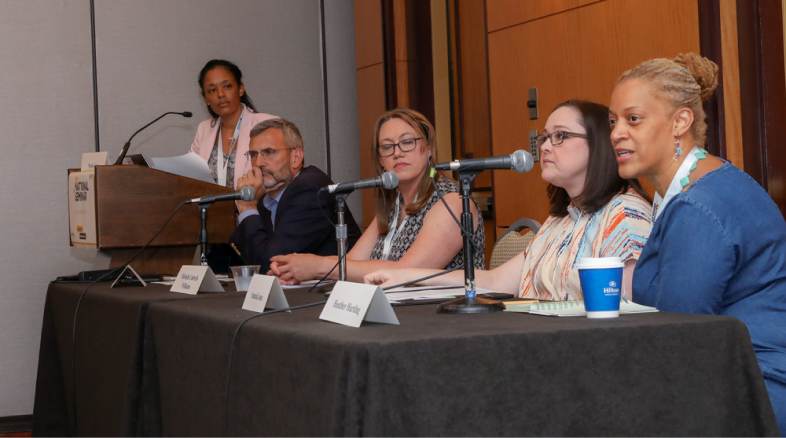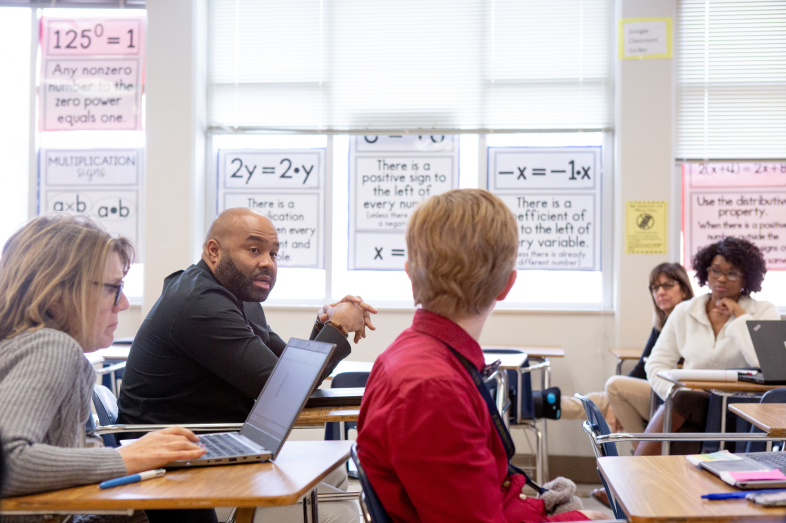As some parents, community members, and policymakers object to certain topics students read in schools or libraries, education reporters are covering the rising tensions: Controversies over book bans; anger about those discussing race, gender, sexuality, and inclusivity in classrooms; and educators facing restrictions in what they can discuss with students.
What’s at the root of the issue?
Robert Pondiscio, a senior fellow at the American Enterprise Institute, said communities should be discussing what happens in schools. He added that recent discussions were caused by the pandemic, which gave parents a never-before seen view into classrooms. As public servants, public teachers’ roles are inherently political, he said.
“The work that we do as teachers happens in a public—yes, political—context. It’s unavoidable,” Pondiscio said. He previously worked as a civics teacher before becoming a fellow at the center-right think tank. “You are about to have tremendous influence over a captive audience of other people’s children.”
A speaker at the Education Writers Association’s 2023 National Seminar, Pondiscio was part of a June 3 panel moderated by ProPublica Reporter Nicole Carr. Other speakers included Michelle Cottrell-Williams, educational specialist at Fairfax Public Schools in Virginia; Heather Harding, executive director of Campaign for Our Shared Future; and Amanda Jones, president of Louisiana Association of School Librarians.

Follow the Story
If you report on the controversy of a book pulled from a library shelf, that might not be the end of the story. If a parent complaint leads to a book removal, some schools or districts have procedures that determine whether the content can be reinstated after a period of time.
In 2021, a review committee in Katy, Texas determined that the book “New Kid” by Jerry Craft was not inappropriate a week after the book was removed and an author talk was canceled. This year, in York, Pennsylvania, the school board voted to return books to the shelves after they were removed over parental concerns. The board created a new policy, so parents can object to certain books for their children without removing them for every child.
Carr urges journalists to be accurate in their language around banned books.
“Let’s be careful not to talk about banned books when books have been challenged … and we’re calling something that’s been put back on the shelf a banned book,” she said. “We don’t follow through with the reporting sometimes and say what’s actually happened with it and label it correctly.”
Report on the Process
Find out what the actual procedure is for determining how school districts evaluate curricula and how librarians choose books for the library collections. Ask about who is making those decisions and whose perspectives are considered.
Jones, a teacher-librarian in Louisiana, hands out catalogs to students and teachers to gauge interest in certain stories.
“We make the decisions as a school about what books are placed on those shelves,” she said. Ultimately, I have the final say so, but I choose books that the kids want to read and that they can see on the shelves, and I make sure that it is a well-rounded collection that represents everyone in the community. Everyone in my school regardless of sexual identity, gender, race, religion, background.”
Learn and report on the policies for challenging books and content, and whether those items are put back in use after a certain period of time.
Broaden Your Perspectives
Parents’ rights groups have been receiving a lot of attention from the media in their attempts to influence school boards and school curriculum.
Harding said she wants reporters to keep in mind that most parents do not want their students’ education to be politicized.
“The vast majority of families and parents want public schools that are inclusive, and that respond to their needs, and are not overrun by politicians,” she said.
Journalists should take stock of which voices they are elevating in stories about “parents’ rights” and whether there are other voices who also have concerns that aren’t being highlighted, Cottrell-Williams said.
“This isn’t new that parents and their kids are having inadequate experiences at school, or a clash in values with the teacher and the parent and the family,” she said. “It’s just that now all of a sudden we care. And I think it’s important to interrogate why we suddenly care, what we’re doing about that, and whose comfort we are seeking to center and prioritize.”
Reporters should also dig deeper on identity and add that context to their stories. If someone speaks at a school board meeting and says they are a parent, verify it. Teachers, librarians, and school staff can also be parents, so stories shouldn’t necessarily be framed as teachers versus parents.
Finally, don’t just cover the parents and groups who are speaking up in opposition to certain books and lessons. Also talk to individuals whose perspectives are portrayed in those books and what it’s like to have their identities viewed as controversial.
“A lot of reports have been done on myself: a white, straight, cis-gendered librarian,” Jones said. “I’d like to see more stories of the students and their families whose identities are being erased by these books being censored. I’d like to see more of these marginalized authors.”





